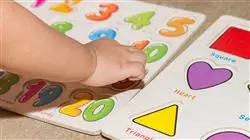University certificate
The world's largest faculty of education”
Description
What are you waiting for to enroll? Do it now and face the challenges of the field of education"

Language is the main tool used by human beings to transmit thoughts, ideas or feelings; however, when there is a lack of a sense such as speech or when it is difficult to manage it, it is necessary to resort to efficient alternatives, being these other types of communication or physical therapies. Among the most common disorders we can find stuttering, selective mutism or the inability to express oneself correctly, so in these cases it is necessary to assist with a specialist who contributes from their experience and knowledge.
In this way, the teacher assumes several cases within the classroom and has to manage those students with communication difficulties or disorders. Therefore, this program is an opportunity to update their knowledge based on the most innovative and most effective therapies today.
Therefore, this Postgraduate certificate offers a complete program in the management of children, adolescents and young people with difficulties or inabilities to communicate effectively. Inside, the professional will be able to find a broad syllabus, which not only covers the solution of the problem, but also delves into the origin of the problem. In addition, they will find high-impact audiovisual material, readings of high academic value and practical exercises that emulate real situations of the profession.
Finally, once the qualification has been passed, the teachers will acquire new competencies that will contribute to their profession, so that they will become experts in the use of state-of-the-art techniques for the treatment of communication disorders.
Contribute to the treatment of disorders such as stuttering, selective mutism and shyness"
This Postgraduate certificate in Approach to Students with Communication Disorders contains the most complete and up-to-date educational program on the market. Its most notable features are:
- The development of case studies presented by experts in Communication Disorders
- The graphic, schematic, and practical contents with which they are created, provide practical information on the disciplines that are essential for professional practice
- Practical exercises where the self-assessment process can be carried out to improve learning
- Its special emphasis on innovative methodologies
- Theoretical lessons, questions to the expert, debate forums on controversial topics, and individual reflection assignments
- Content that is accessible from any fixed or portable device with an Internet connection
This Postgraduate certificate is an opportunity for you to understand the causes of communication disorders and to successfully address them"
The program’s teaching staff includes professionals in the sector who contribute their work experience to this program, as well as renowned specialists from leading societies and prestigious universities.
The multimedia content, developed with the latest educational technology, will provide professionals with situated and contextual learning, i.e., a simulated environment that will provide immersive learning, designed for specializing oneself in real situations.
The design of this program focuses on Problem-Based Learning, by means of which the professional must try to solve the different situations of professional practice that arise throughout the academic course. For this purpose, the students will be assisted by an innovative interactive video system created by renowned and experienced experts.
A compendium of updated information selected by experts in the field who know what the current needs of the field are"

TECH offers you an innovative and high-impact program, which will complement your career to reach the top of your profession"
Syllabus
The design of this program brings together the best academic topics in the field of communication disorders, addressing the causes and consequences of impairments in expressing thoughts or ideas. It also delves into the different forms of expression, being speech, writing, sign language and images. Therefore, the module to be developed comprises several disciplines, all necessary in pedagogy and in the treatment of pathologies.

A syllabus developed by experts in the sector, so you will learn from them the best techniques for the treatment of disorders that affect language"
Module 1. Communication Disorders
1.1. Concept and Definition of Communication and Its Disorders
1.1.1. Definition of Communication
1.1.2. Types of Communication
1.1.3. Definition of Language
1.1.4. Stages in Communication
1.1.5. Definition of Disorder
1.1.6. Introduction to the Nervous System
1.1.7. Description of the Communicate Process
1.1.8. Difference between Communication and Speech
1.1.9. Language in Relation to Auditory and Visual Processing
1.1.10. Concept of Communication Disorders
1.2. Classification and Typology of Communication Disorders
1.2.1. Specific Language Disorder
1.2.2. Language Delays
1.2.3. Social Communication Disorder
1.2.4. Speech Sound Disorder
1.2.5. Childhood-Onset Fluency Disorder (Stuttering)
1.2.6. Selective Mutism
1.2.7. Students with Hearing Loss
1.2.8. Specific Learning Disorders
1.2.9. Academic or Educational Problems
1.2.10. Unspecified Communication Disorder
1.3. Neurological Basis for Development and Learning
1.3.1. Human Development Pyramid
1.3.2. Developmental Phases
1.3.3. Developmental Levels
1.3.4. Location of Language Skills in the Developmental Pyramid and Its Importance
1.3.5. General Outline of Neurodevelopment
1.3.6. Perceptual and Motor Neurodevelopent in Childhood
1.3.7. Developmental Areas that Influence Language
1.3.8. Cognitive Development via Communication and Language
1.3.9. Social and Affective Development via Communication and Language
1.4. Incidents in Developmental Stages
1.4.1. Early Language and Speech Development
1.4.2. Early Childhood: Language Development
1.4.3. Development of Spoken Language
1.4.4. Vocabulary Development and Grammatical Knowledge
1.4.5. Development of Communication Knowledge
1.4.6. Illiteracy: Written Language Comprehension and Use
1.4.7. Learning Difficulties in Reading
1.4.8. Emotional and Affective Development in Students
1.4.9. Diseases Related to Language Disorders
1.4.10. Other Incidents
1.5. Multiprofessional Coordination
1.5.1. Teacher Specialized in Therapeutic Pedagogy for Teachers
1.5.2. Hearing and Speech Teacher Specialist
1.5.3. Special Education Monitors during Schooling
1.5.4. Educators
1.5.5. Curricular Support Teachers
1.5.6. Sign Language Professional
1.5.7. Deafness and Blindness Mediators
1.5.8. Social Educators
1.5.9. Educational Guidance Teams
1.5.10. Specialized Educational Guidance Teams
1.5.11. Guidance Departments
1.5.12. Professional Eye Disease Doctors
1.6. Documentation and Organization According to Student Needs
1.6.1. Psychopedagogic Tests
1.6.2. Psychopedagogic Evaluation
1.6.3. Neuropsychopedagogic Reports
1.6.4. Speech Therapy Report
1.6.5. Specific Medical Documentation for Language Disorders
1.6.6. School Documentation
1.6.7. Social Organization
1.6.8. Center Organization
1.6.9. Classroom Organization
1.6.10 Family Organization
1.7. Educational Intervention According to Developmental Stages
1.7.1. Logopedic Intervention According to Developmental Stages
1.7.2. Adaptations at the Education Center Level
1.7.3. Adaptations at the Classroom Level
1.7.4. Adaptations at the Personal Level
1.7.5. Educational Intervention in Early Childhood
1.7.6. Educational Intervention in Second Childhood
1.7.7. Educational Intervention in Maturity
1.7.8. Intervention with Families
1.8. Adapted Tools and Supplies
1.8.1. Tools to Work with Communication Disorders Students
1.8.2. Adapted Individual Supplies
1.8.3. Adapted Collective Supplies
1.8.4. Linguistic Skills Programs
1.8.5. Programs to Promote Reading and Writing
1.8.6. Adapting Curricular Elements
1.8.7. ICT Influences
1.8.8. Auditory and Visual Stimulation
1.9. School-Based Socio-Community Intervention
1.9.1. Concept of Socio-Community Intervention
1.9.2. Student Schooling
1.9.3. Child Socialization
1.9.4. Extracurricular Outings
1.9.5. Family Circle
1.9.6. Relation Between Family and School
1.9.7. Peer-to-Peer Relationships
1.9.8. Leisure and Free Time
1.9.9. Professional Formation
1.9.10. Social Inclusion
1.10. Disorder Evaluation and Prognosis
1.10.1. Manifestations of Communication Problems
1.10.2. Speech Therapy Report
1.10.3. ENT Physician Evaluation
1.10.4. Subjective Hearing Tests
1.10.5. Psychopedagogic Evaluation
1.10.6. Speech Therapy Rehabilitation
1.10.7. Family Coexistence Analysis
1.10.8. Auditory Treatments
1.10.9. Family Coexistence Analysis
1.10.10. Treatment

This Postgraduate certificate is the best investment you can make for your professional projection and your future"
Postgraduate Certificate in Addressing Students with Communication Disorders
TECH Global University's Postgraduate Certificate in Addressing Students with Communication Disorders is the perfect educational program for those professionals and educators who wish to specialize in supporting students with communication disorders. In this Postgraduate Certificate, you will gain theoretical and practical knowledge about the different communication disorders that can affect students, such as autism spectrum disorder, dyslexia, language disorder, among others. Through virtual classes, you will have access to updated and quality content, taught by Postgraduate Diplomas in the field of special education and communication. Virtual classes give you the flexibility to study from anywhere and at any time, adapting to your personal and work schedule.
Develop skills to provide specialized educational support with TECH.
At TECH Global University, we work to offer you the best possible continuous learning, adapted to the needs and demands of today's labor market. You will have interactive University reCourse, explanatory videos and discussion forums that will encourage collaborative learning and the exchange of experiences with other professionals. One of the main benefits of this Postgraduate Certificate is that you will be able to apply the knowledge acquired in a practical way. Throughout the program, real cases and study situations will be presented in which you will be able to put into practice the strategies and intervention techniques to improve students' communication. Upon completion of the Postgraduate Certificate in Addressing Students with Communication Disorders, you will be prepared to provide specialized educational support to students who need it. You will be able to design and implement inclusive pedagogical strategies, adapt didactic materials and work collaboratively with the teaching team and families. Don't miss this opportunity to develop skills for addressing students with communication disorders.







